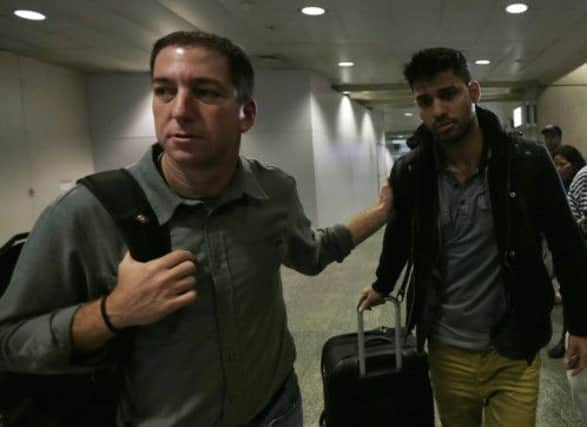Dani Garavelli: Breaking big stories always a dirty job


Either the reporter who has been the principal conduit for Snowden’s leaks is a hero, defiant in the face of an overbearing state, or he is a liar who is willing to put the security of the entire western world at risk just to feed his own ego.
The same split emerged last week over the news that Greenwald’s partner David Miranda had been held for nine hours at Heathrow Airport under Schedule 7 of the Terrorism Act 2000. For Greenwald advocates, the move was an abuse of power, an act of retribution aimed at shutting down the Snowden story.
Advertisement
Hide AdAdvertisement
Hide AdFor his decriers, it was the only feasible option for police given Miranda was carrying encrypted information which could place lives in jeopardy.
Even when the Independent ran a story suggesting the NSA documents obtained by Snowden included details of a secret internet monitoring service in the Middle East, commentators stayed rigidly in their camps, maintaining either that, frustrated by the pace of revelations in the Guardian, Snowden had gone rogue and leaked the information to a rival newspaper, or that the Independent had been duped by the government which hoped to use the story to underline the threat Greenwald posed to national security (and so justify Miranda’s treatment).
Both camps have plenty of evidence to back up their positions. On one hand, thousands of people a year are held at UK airports under the act, but very few are detained for the maximum nine hours, or have mobile phones and computers confiscated, suggesting the move was an attempt to intimidate Miranda – and by extension Greenwald.
On the other, Greenwald’s statements on the detention – he said Miranda wasn’t working as a journalist (the Guardian paid for his tickets), he said he was denied access to a lawyer (he wasn’t) – and his impetuous threat to punish the UK by publishing more details on its spy system do create an impression of a man who isn’t overly troubled by scruples.
As in most subjects, the truth is liable to be a complex mix of the two. Miranda was neither a disinterested party nor a “mule”; and he was in possession of information which could be regarded as a threat, but that does not mean his detention was not an affront to his human rights.
And, sure, Greenwald is not without his faults, on the evidence of the last few days, he can be disingenuous, self-righteous, too much in awe of Snowden and openly contemptuous of those who disagree with him. But that does not mean he is necessarily insincere in his attempt to expose the scale and sophistication of US/UK surveillance operations.
Investigative journalism, like police work and espionage, is a messy business and those who excel at it tend to be willing to inhabit an ethical grey area (although there are lines they should never cross). In my experience, if an injustice is to be exposed in defiance of others’ attempts to cover it up there are always trade-offs.
And I do have some experience. Two chief constables tried to have me jailed 17 years ago for refusing to name a whistleblower who had passed on information from the Police National Computer, which showed how some officers in the Northumbria force were massaging crime figures (the High court in London eventually ruled the story was in the public interest and I had a right to protect my source).
Advertisement
Hide AdAdvertisement
Hide AdThe lessons I took away from the ordeal include: When you take your first steps on a story which puts you in conflict with authority it is impossible to foresee all the possible repercussions (though Guardian editor Alan Rusbridger must have been braced for trouble, he could not have predicted two GCHQ security experts overseeing the destruction of hard drives in the basement of the newspaper offices).
No matter how reliable your source appears to be, they may act erratically under pressure.
Even though the need to balance the value of your story against the risk it poses to others may be uppermost in your mind, whether or not you called it right is unlikely to be clear until the last card has been played and the profit or loss can be tallied. Was my story worth the loss of a man’s job and a 20-month battle?
Only in the sense that, once those in authority try to trample on your rights and the rights of others, you have little choice but to fight them. In Greenwald’s case, of course, the risks are so much greater and the stakes far higher.
Few would argue that the revelations about state surveillance in the Guardian so far are not in the public interest, even fewer that printing everything in the leaked documents would be anything other than utterly irresponsible.
Post-Leveson, we seem to expect journalists to break big stories without getting their hands dirty. Perhaps some people believe it’s possible to expose corruption without bending a few rules. They are kidding themselves. As far as it is possible to discern (and assuming they weren’t behind the Independent’s story), Greenwald et al have done their best to walk the tightrope between exposing important truths and endangering lives. Given the gravity of the information they are handling and the strength of the forces ranged against them, I don’t see what more we could ask of them. They may not be the squeaky-clean heroes some crave, but, in their defence of press freedoms, I reckon they’re heroes all the same. «
Twitter: @DaniGaravelli1